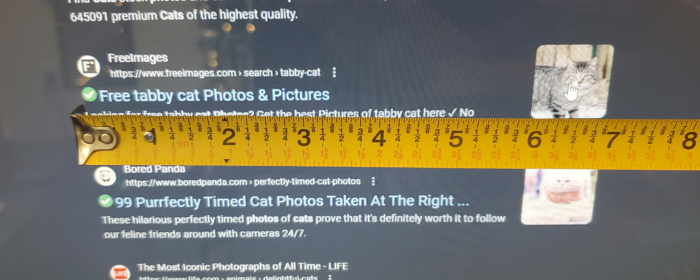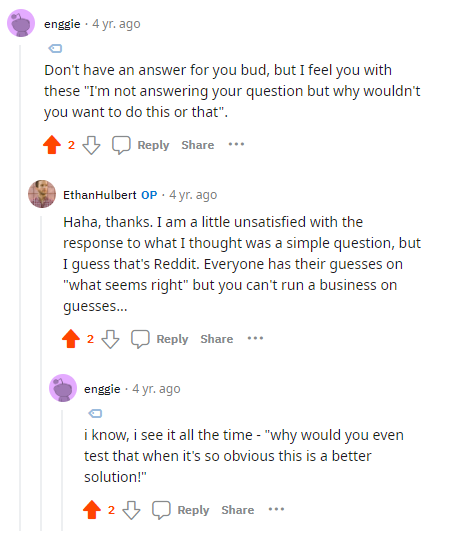Who Fears the Ellipses? or, Change Your Mindset: Long Title Tags are Better for SEO
Last updated 05/03/23 ✧ First posted 05/03/23
~6 minutes to read.
It has long been common knowledge in SEO that title tags should max out around 60-70 characters, give or take.
These guidelines have been prescribed for as long as I can remember–certainly since 2012, which is around when I first got into SEO. But I’ve always been confused about it.
(Technically it’s pixel width, not character count, but the difference is irrelevant for this discussion.)

The reasoning is simple. If you go too far over these limits, you risk your text being cut off and truncated by an ellipsis, those dreaded three dots (“…“).
And nothing is worse than that, right? Obviously if your text gets replaced by ellipses, potential readers or customers are going to see your SERP listing and move on to the next one instead. This happens all the time and is so common that it’s worth putting character counters into nearly every SEO tool, and issuing warnings or errors if the character count goes over.
Leading companies like Moz, SEMrush, and Ahrefs all recommend staying in this range. Yoast and All-in-One SEO, two major WordPress plugins, keep track of this. Enterprise solutions like BrightEdge keep track of this in automated aggregates. I could go on forever.

I have a hunch that it’s so common simply because character counters are easy to program, so why not throw it in as one more marketable feature. Plus if all of your competitors already have it, and you don’t, maybe it looks bad on you–the feature is now self-sustaining.
But is this really, actually important?
Do people actually care about ellipses? Do people even notice them at all?
A Complete Lack of Evidence
It seems like having your text cut off after 60ish characters would be a bad thing (I guess). But as a data-driven marketer, I know that sometimes, what “feels true” or “seems right” by your gut isn’t always accurate at all.
(To be honest, neither way has ever seemed more beneficial than the other to me–my gut has been completely silent on this issue.)
Yes, trusting your intuition as a marketer can be extremely valuable with experience. But the intuition does have to be based in data at some point.
So let’s look at the data.
…
……
Just kidding! There isn’t any.
As far as I can tell, no research has been done to see the effects of ellipses-laden results vs. non-ellipses results. And I’ve looked. And I’ve asked around on subreddits, too. No one can back it up with any data.
Here’s me asking, no, begging, for any crumbs of data anyone might have had back in 2018! And all I could get were some comments saying “well of course it’s important it’s just common knowledge” and then one guy sympathizing with me for getting nothing but crappy answers.

Hey, if you have any actual studies, please let me know.
But without any data on clickthrough rate, the SEO industry is really just saying that this is a rule because it feels right.
That’s just not good enough.
Especially when there actually is rationale suggesting longer titles are better for SEO.
Google has never recommended shortening your title tags. In fact, Google reps have come out and basically said the whole thing is ridiculous.
This happened during an interview in 2021–a solid 3 years after I had publicly highlighted the issue myself, if you recall.
When Gary Ilyes, a Google employee who talks about SEO, was asked if there was value in longer title tags, he had a very insightful answer:
Yes.
– Gary Ilyes
After more discussion, he referred to the 60 character “limit” rules from third parties as “externally made-up metrics.” He then goes on to give the best REAL advice about title tags that Google has ever offered:
The reason why I try to steer people away from thinking about concrete numbers is it’s not even about how we display titles, but rather, how we construct our serving index and how we tokenize the page itself.
Technically, there’s a limit, like how long can it be anything in the page, but it’s not a small number. It’s not 160 characters or whatever–100, 200, 20, or whatever.
Try to keep it precise to the page, but I would not think too much about how long it is and whether it’s long enough or way too long.
If it fills up your screen, then probably it’s too long, but if it just one sentence that fits on one line or two lines, you’re not going to get a manual action for it.
– Gary Ilyes
With this rationale in mind, let us think about title tags with a whole new frame of reference.
You do not have to limit yourself to 60 characters. You can go on for sentences! Whole lines worth of title material!
Yes, of course you have to be mindful that only the first 60ish characters actually show up to a user, and also that words towards the front of the title tag hold a little more SEO “weight” than words at the end.
You also have to remember the “thin tab” effect, which is when a user has a hundred browser tabs open and all that shows up is your favicon and the first character or two of your page, so hopefully they’re not all the same.
![]()
(Have you ever considered optimizing the first six pixels of your title tag?)
But that’s where it ends.
The Promised Land
For too long, many SEOs have considered anything past the 60 character mark a no-go zone. (This is especially true of newer SEOs who have been brought up using these tools.)
My friends, this is the exact opposite of how we should think. Past the 60 character mark is our space to shine.
In a way, it almost feels like cheating. I mean, a method to have very important text that impacts rank without being directly visible to customers? It’s like the old “white text on a white background” keyword hack on steroids.
I’m obviously NOT suggesting we be spammy with it. Keyword stuffing is still bad. If this ever catches on in a big way, mark my words, Google will take action to reduce non-visible title tag keyword effectiveness, and we definitely don’t want that.
Google guidelines don’t mention character limits, but they DO say to “avoid unnecessarily long or verbose titles.” It’s perfectly possible to be 250 characters in and not be unnecessarily long or verbose, but we all know that some SEOs out there have a tendency to ruin good things.
I’ve seen this advice start to be hinted at a little more often, but only hints, only very light suggestions. Certainly no service has deemphasized the prominence of its 60-or-death character counter warning features. I have seen other veteran SEOs talk about this, but I haven’t seen much put down in writing, beyond a comment section here or there.
It’s time to get with the program already. If you call yourself data-driven, then stop cutting your titles off at 60-70 characters, and start embracing multiple sentences’ worth of title tags.
Besides, with how it’s going these days, Google will rewrite all your titles no matter what you do.
So yes, it’s always a balance. Yes, put your most important keywords up front, don’t forget your separators and branding at the end of every page. And all the other title tag tips that actually are backed up with results that this article doesn’t need to readdress.
But as far as length goes, it’s time to let go of the crutches of the past.

Next time you’re writing title tags, break out your measuring tape.
✧ ✧ ✧
Written by Ethan J. Hulbert.






